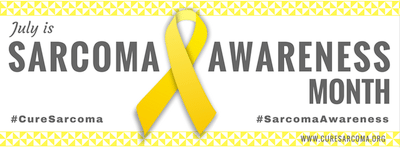Sarcoma is not a term we hear about often and in some cases people may not even realize it is a form of cancer. The month of July has been designated as Sarcoma Awareness Month in an effort to educate people on what Sarcoma is and make this “not so common” term something that more and more Americans are aware of and understand better.
There are various forms of sarcoma, and according to the Sarcoma Foundation of America (SFA) there are approximately 15,000 new sarcoma cases diagnosed each year with about 6,000 deaths from sarcoma annually. Sarcomas make up an estimated 20% of all childhood cancers but only 1% of all adult cancers.
Sarcomas primarily arise in the body’s connective tissue which means they can appear in almost all areas of the body and occasionally develop in a specific organ. According to the Sarcoma Foundation of America (SFA), sarcomas are sometimes hard to diagnose because they can grow deep within the body which in some cases may mean they are harder to detect. Nonetheless, it is extremely important for adults and children to be vigilant if they feel a lump or bump in their body. Many lumps and bumps are considered benign processes, but it is always better to be safe and have it checked out by a medical professional to be sure
You may wonder what some of the risk factors are for developing sarcoma. The SFA has shared some potential causes of sarcoma which include:
- Occupational exposure to phenoxyacetic acid in herbicides and chlorophenols in wood preservatives or vinyl chloride used in manufacturing plastics may increase one’s risk for developing sarcoma.
- Genetics and certain inherited diseases may also contribute to an increased risk of developing sarcoma. An example provided by the SFA includes: people with Li-Fraumeni syndrome (associated with alterations in the p53 gene) or von Recklinghausen’s disease (also called neurofibromatosis, and associated with alterations in the NF1 gene) are at an increased risk of developing soft tissue sarcomas.
The SFA also stated “in the vast majority of cases, sarcoma is a completely random event in a family’s cancer history”.
Sarcoma treatment depends on the stage of the tumor at the time of diagnosis. The size of the tumor, grade of the tumor and any evidence of local, regional or distant spread of disease will impact the treatment options available for patients. The preferred method of treatment is surgery as a starting point. This may or may not be combined with radiation and/or chemotherapy.
Cancer researchers are working hard to identify other potential treatment options for sarcoma patients. According to updates provided by the Sarcoma Alliance in their Fall 2017 Newsletter, “many sarcomas are associated with a mix-up of two chromosomes” and “scientists are now beginning to develop drugs that target these specific mix-ups. These types of drugs could completely spare normal cells and target only cancerous ones.” Additionally, the Sarcoma Alliance shared some really interesting information about researchers at UT Health in San Antonio, TX, who are using zebrafish to help identify new sarcoma treatments. Read more about the great work being done at UT Health and how zebrafish are contributing to cancer research by clicking here.
Additionally, the Sarcoma Alliance shared some very interesting but scary sarcoma facts in their Fall 2017 Newsletter which are quoted here:
“Sarcoma is often misdiagnosed as abscessed cysts, sports injuries, or other non-cancerous conditions, and the delay allows it to become a more difficult-to-treat advanced cancer”.
“In the early stages of the disease, there may be no symptoms. Any persistent lump, bump, pain, or weakness should be checked for a sarcoma, particularly lumps larger than a marble in a child or a golf ball in adults.”
These are some very strong statements that everyone should be sure they remember if or when they notice a lump or bump in their body especially if you are asymptomatic. Don’t brush it off as being “nothing”, it is always best to get it checked so if it turns out to be something serious there is time to establish the best possible treatment plan for the best possible outcome.
The Sarcoma Foundation of America has provided this link to various medical facilities nationwide that specialize in the treatment of sarcoma along with a listing of clinical trials presently available here.
There are many ways to get involved and support Sarcoma research and advocacy. Visit the following websites for a comprehensive list of ways you can help:
https://sarcomaalliance.org/get-involved/ and https://www.curesarcoma.org/get-involved/
Please share this information and help spread the word about Sarcoma and help educate as many people as we can!
Resources:





